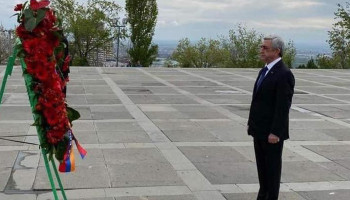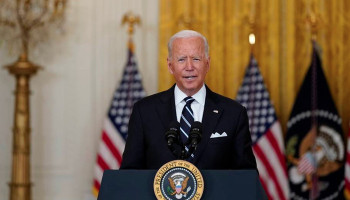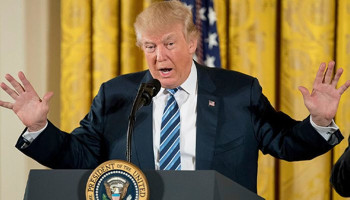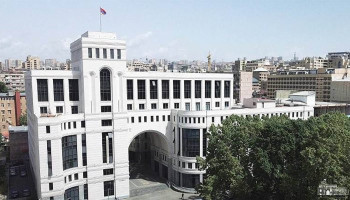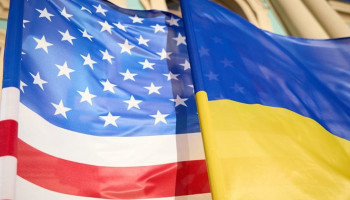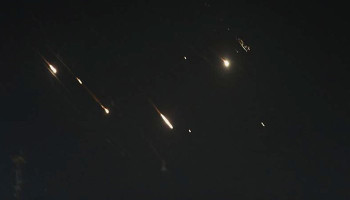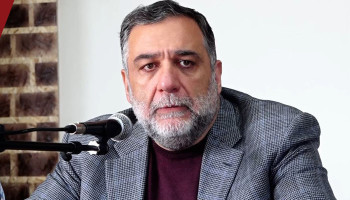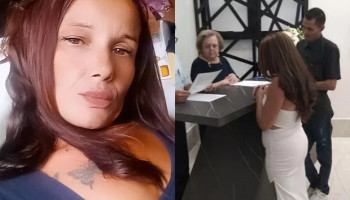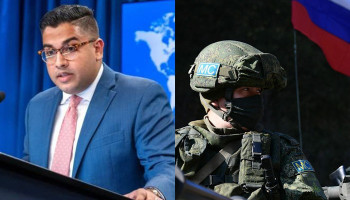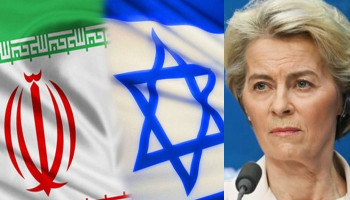Ruben Vardanyan's Interview with BBC HARDtalk
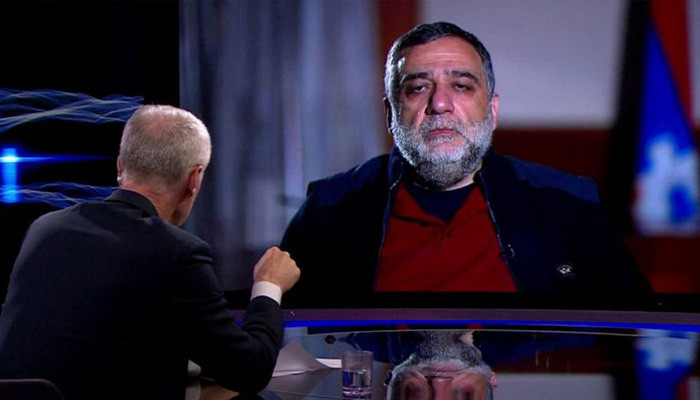 State Minister of Artsakh Republic Ruben Vardanyan gave an interview to BBC HARDtalk programme. Stephen Sackur - Ruben Vardanyan in Nagorno-Karabakh, welcome to our HARDtalk. Thank you. Mr. Vardanyan, maybe our HARDtalk audience may not know very much about Nagorno-Karabakh. You are the State Minister in a tiny territory of some 120 000 people and right now, you have an urgent crisis because your land route out to Armenia is currently blockaded. What is the situation for the people living in your territory today? Ruben Vardanyan - First, I would like to thank you for this interview. It's important for the world to know what's happening in a locked out territory where, 120 000 people living in their homeland for thousands of years, for the last 35 years have been fighting for their independence. And 38 days, since December 12, Azerbaijan's so-named ecoactivists blocked the road and with the support of Azerbaijani state now they control the road, and we don't get anything but from the Red Cross and the Russian peacekeepers. We have 30,000 children, it’s winter, electricity is limited; there is practically no gas now, and food, medicine, and gasoline would not be on our territory without the help of the Red Cross and the Russian peacekeepers. Stephen Sackur - So, the Red Cross is making sure that some medicines get through, but I noticed that the authorities implemented a rational system where buckwheat, sugar, rice, and cooking oil are made available. But it seems to me if this continues, your territory won't be viable for very long, will it? People are going to suffer, and this cannot continue. Ruben Vardanyan - Firstly, the Red Cross is only one or two trucks, and 15 000 is quite a limited quantity of medicine or food they can bring, including the Russian peacekeepers; there is no illusion about how much they deliver. Secondly, you don’t know well that the Armenians in Artsakh are strong people. We’ve been living in here thousands of years, and we are strongly committed to stay in our homeland. As I said, for 35 years, we have been fighting and defending our territory; we believe in our values and our system. With all the difficulties we are facing, I believe that people will stay strong and committed to our homeland. Stephen Sackur - You just referred to your territory as Artsakh, I should clarify that while you in your territory refer to it as Artsakh, the Azerbaijan’s government calls it Nagorno-Karabakh, as indeed does the international community, so I just want to be clear about that. The biggest confusion to me about what is happening right now is that you have around 2000 Russian military personnel on your territory as supposed peacekeepers, now why are they not opening the road to make sure that supplies can get through? Ruben Vardanyan - Before answering this question, I would like to say that if you look through the history books in Azerbaijan Soviet Republic of the 1980s, you will find the same name of Artsakh mentioned as Armenian territory. So, I am not saying something new, it already existed in the Soviet time, in Azerbaijani history books at schools. But let’s go back to your question. First, people need to understand it’s only 2000 peacekeepers, and they have limited mandate to use weapons, and it’s ecoactivists, and civilians who closed the road, formally. That’s why without delusion, it’s a small contingent of soldiers, only light weapons, and they have no right to shoot. That’s why, for any peacekeepers, it’s always very difficult to interfere between the two sides if the conflict is going on. Stephen Sackur - But the truth is, Mr. Vardanyan, that right now Vladimir Putin has much bigger problems on his plate. The invasion of Ukraine has led to a war, which is sucking up resources in Moscow, and the last thing, Putin frankly wants to do is getting involved in a conflict in Nagorno Karabakh. That’s the truth. It leaves you much weaker, doesn’t it? Because Russia’s support is not just forthcoming. Ruben Vardanyan - First, I don’t know what’s happening in his decision-making. But we have a limitation: on November 9, 2020, Azerbaijan, Armenia, and Russia signed a document, where the number of the soldiers was limited by the Azerbaijani side, that’s why I don’t know what you are talking about, maybe they have sent, or have not, but today, we are following the document we signed, which Azerbaijan today fully violates. Because they guaranteed open road for Armenians living in Artsakh without any control, and now they are in full violation. Stephen Sackur - Yeah, I understand that there was misunderstanding involving the Armenian government, the Azerbaijani government, but what’s interesting to me is that the Armenian government led by the Prime Minister Nikol Pashinyan is now very critical of Moscow, saying that the Russian peacekeepers are failing in their duties. But you interestingly are being much less critical about Moscow, why? Ruben Vardanyan - You know I advise you to come here with us and you will understand how it’s important when you are surrounded by a state of 10 million people with lot of money, lot of weapons and we have only 120000 people with 30000 kids, which need to be safe, and we have 2000 Russian soldiers․ Do you want piss them off? I want to ask you this question – are you ready to piss off the people who stay with you in this situation? Stephen Sackur - Well, I’m here in London. You are in Nagorno-Karabakh, and the reality for you is that what you have to deal with, and it seems right now that not only other Russians are not helping you, but your relationship with Armenia and, in particular, with Prime Minister Pashinyan is becoming increasingly toxic. The Yerevan government doesn’t seem to have a working relationship with you. Ruben Vardanyan - I don’t know about this information. By the way, in our country, person number one – the president – is always in good contact with the prime minister; I don’t know what you are talking about, and this is a speculation, which I am not sure makes sense to have reference in our conversation. Stephen Sackur - I think it is important to look at your background and why you are sitting in Nagorno-Karabakh today. You're a wealthy man, who worked at least one billion dollars thanks to a business career in Moscow which coincided with Vladimir Putin's rise. Then clearly the two of you are quite close. Why did you decide last year to renounce your Russian citizenship which requires special permission from Putin and remove yourself from Russia and decide to live in Nagorno-Karabakh? Why did you do that? Ruben Vardanyan - First, I started my business in 1991 with the 35,000 dollars of American investors, and with my partners, I built the best investment bank in this region, bringing plenty of investors and biggest companies to Russia. I made business in England, and in the United States. I have a board membership in thirty different countries, and I've been doing philanthropy and socials in many places. That’s why I think your conclusion about my closeness with Vladimir Putin is not right because I’ve been working with many-many people in power and in different countries, also in the private sector and that is why… Stephen Sackur - You know that the Organized Crime and Corruption Reporting Project and the Navalny Anti-Corruption Foundation have both accused you, let's put it this way, of doing dodgy business dealings in the past. Now you have never been charged with anything but, nonetheless, there are allegations that you have been part of the oligarch system that Vladimir Putin, you know, watched over and that's partly an explanation of your great wealth. Ruben Vardanyan - Look, this was published four years ago, and it is four years that I have kept my position in many-many international organizations, which confirms that people who know the truth, people who know me personally, understand what this is all allegations without any proof because no legal case in any place, in any country ever happened. Moreover, there are allegations about king Charles, about George Clooney and many others of my colleagues and friends who have worked with me in different projects, like the Prime Minister of Singapore Lee Kuan Yew and many other people which I had the privilege to know and work with. That is why, with all my respect to journalists who did their work, that allegation was just a publication without any proof. Secondly, the financial institution I was running at that time had trillions of dollars of turnover with their hundreds of thousands of clients, and blaming Ruben Vardanyan for doing something was like blaming J.P. Morgan or the City Bank for doing something this way. Of course, being responsible, but not doing it themselves. I think this is really manipulation, and you are using this information again… Stephen Sackur - Well, I am simply reflecting the records, and you are, of course, welcomed to challenge anything I say. But the truth is that the Azerbaijanis, in particular, say that you are... I am quoting here political analyst Elkhan Sahinoglu in Baku. He says: Ruben Vardanyan is Moscow's man in Karabakh. And the president is preparing for you to take complete charge in Nagorno-Karabakh. Is that your intent? Ruben Vardanyan - You know, I thought our problem would be about human rights, about the situation in humanitarian catastrophe. And if you go on with all these speculations, especially Azerbaijiani side, we can go forever. I would prefer to talk about how the 120,000 people are surviving this horrible times and pressures from the political side or “ecoactivists.” By the way, I recommend you to check how many ecological protests have ever happened in Azerbaijan during the last thirty years, and how many times the autocratic regime of Aliyev allowed any opposition in Azerbaijan, not Armenians, to say any word against him. We are talking about something I am really surprised at. You are not touching the point of what’s happening now here, and what is the behaviour of Azerbaijan. By the way, today EU Parliament… Stephen Sackur - I am more than interested in talking about what is happening, but what is happening clearly is part of the bigger picture. The bigger picture is that the conflict on and around your territory, between Armenia and Azerbaijan has been going on for many decades. What we saw in 2020 was that the Azerbaijani military scored a major victory, pushed Nagorno-Karabakh back, and you lost more than two-thirds of the territory you controlled before 2020. You now control a tiny enclave which is suffering from the economic blockade right now, and it seems to me your only realistic option is either to work out a political deal with Azerbaijan or for the people, the Armenian community in Nagorno-Karabakh, to decide that this is no longer sustainable and leave the territory. So, which is it to be – a political deal or leave? Ruben Vardanyan - First, let me finish. Today, EU Parliament just approved the resolution with the strong message to president Aliyev, requesting to lock out the road. This shows that France, the EU Parliament, and the United States surprisingly have a common view about this issue, which is really something special because we all know what is the relationship between the major European countries and Russia today. The second... Stephen Sackur - Mister Vardanyan, even if the blockade is lifted, my question remains: how can your community of Nagorno-Karabakh be viable in the long term? Even the Government in Yerevan, the Armenian Government says that this is no longer a territory of issue, they are no longer making a claim to turn Nagorno-Karabakh into an independent state or part of Armenia. They say in Yerevan that it is simply a matter of rights, that it is a question of negotiated guaranteed security and human rights for the Armenian community inside your territory. But the indication is that in the long run you will be part of the Azerbaijani sovereign state. Do you accept that? Ruben Vardanyan - Artsakh people, Armenians living in Artsakh, in 1988 when was Soviet times, said we will never be part of Azerbaijan. They fight for their freedom, and they made all the right legal steps. Today, we are addressing a clear question to the world: do we, people of Artsakh, living in a state, which violates all the human rights even of their own people, have the right for self-determination? How can we live in a country where one family has been ruling the country for 44 years out of 104 years of the existence of Azerbaijan (first as part of the Soviet Union, and then as an independent republic), where there is no right for the Azerbaijani people not to mention the Armenians? How do you see the possibility for an ethnic minority, the way they treat us, to get any right, to get any defense? For us, this is not a question about do we want it or not, we do not see any chance. By the way, in this blockade, yesterday’s incident was the simplest. The children, separated from families, were unfortunately “blocked” in Armenia and couldn't come back to their homes; after six weeks, the Russian peacekeepers tried to bring them back to Artsakh, but the children were stopped and checked by the Azerbaijanis, and were psychologically attacked. Xenophobia is so strong, that’s why... Stephen Sackur - I want to be clear about this, sorry to interrupt but are you saying that for you, and of course, frankly many people say that right now you are running things in Nagorno-Karabakh, you are in no way prepared to have any sort of negotiation or a dialogue with president Aliyev and the Azerbaijan government? Ruben Vardanyan - No, we are ready for negotiations, we are ready for negotiations if the Azerbaijani side understands the negotiations between the two sides. Because what we said from the first day of requesting independence was that we understand and accept we will be living side by side, but we will be separate territories, and separate states; there will be separate rules and laws because we are a democratic country, here four presidents were elected; we do not see ourselves as part of Azerbaijan, but we respect that we will be living in the same region, and we need to find a way despite all the difficulties to find a solution that will be acceptable for both sides, because... Stephen Sackur - So, I take the matter that you fundamentally disagree with the government in Yerevan, who said it is now simply a question of negotiating the right sort of deal for your people, frankly, inside an Azerbaijani state. They say it’s a question of rights, human rights and security rights for your people being guaranteed, but they say it’s no longer an issue of territory or sovereignty. Ruben Vardanyan - First, the Armenian government, the leader of Armenia has said whatever decision the leaders of Artsakh make, we will follow their choice. Second, we got clear messages from France, the United States, and Russia, who also see that this issue is not closed, the page is not turned. That is why, despite all the rhetoric of Azerbaijan, due to the international community, the UN discussions, and the UN security council, it became clear that something is not over because we have a right to self-determination because ethnic the UN charters restrict ethnic cleansing. Despite all the speculations from Azerbaijan, the story is not over, we believe we have the right for independence, we have the right of living in our homeland; most of the people who live in Artsakh understand the difficulties that we are facing, they are ready to stay and defend our home. Although we are small, we are big. Stephen Sackur - Yeah, you say it’s not over, but a big factor in all of this is Russia. For decades, Armenia has relied on Russia for military support. I just wonder what you have drawn in terms of lessons from Putin’s invasion in Ukraine; do you regard that war first as something you should condemn, and do you also see it has dangerous lessons for Armenia? Ruben Vardanyan - Look, I am now the State Minister of a smaller republic where 120 000 people are suffering because of an immense attack from Azerbaijan. And I am responsible to defend my children who live here, and my nation, and whatever needs to defend them I will do it. That’s why I want to answer this question the way that I would say that whatever is necessary to save Artsakh, I will do it. Stephen Sackur - But that’s not an answer at all. I just asked you whether you will condemn Putin’s invasion of Ukraine. Ruben Vardanyan - And I answer you saying whatever is necessary to defend my people, whatever will be right for them in this situation, to stay silent because I believe whatever my answer about the position of Russia, about France, about the United States will damage the opportunity to get international support, that will be wrong for me to comment. That’s why with all my regret, what’s happening in different conflicts, not only in Ukraine, but in Yemen, in Syria and in many other places in the world, I care only about what is happening to my people with blockade for thirty days with no electricity, with no gas. Stephen Sackur - The thing is you are very much out of state with many Armenians living in Armenia because they are worried by the implications by Putin’s invading Ukraine. I am going to quote you Benyamin Poghosyan, the head of the Centre for Political and Economic Strategic Studies in Yerevan. He says: “It is becoming obvious that we can no longer rely on Russia. Even if Russia gets out of the Ukraine war in one piece, they will to try to include Armenia in a sort of union state with Belarus, and that is not something we want.” Do you want that? Do you think that Armenia’s fate and future lies with Russia, Putin’s Russia? Ruben Vardanyan - I don’t want to talk about Armenia, we are a separate country. I am talking about Artsakh. Artsakh will not be part of Azerbaijan, this is clear. Stephen Sackur - Are you happy for a long-term reliance on Vladimir Putin? Ruben Vardanyan - What do you mean? Stephen Sackur - Well, I mean it’s simple, it seems to me that you are saying we are now quite distant politically from Yerevan, from the Armenian government. So, your only guarantor, your only frank hope for survival, is Vladimir Putin. Ruben Vardanyan - That’s not true. President Macron clearly announced and made great efforts to support Artsakh. By the way, the speaker of the French Senate also made the same statement. The US ambassador said recently that we’ll be corporate with Russia trying to find a solution to help Artsakh get out of this situation. That’s why you are manipulating a little because the western biggest country, like France, the United States, also clearly send the message that we care about what’s happening here. Stephen Sackur - You know there are people inside Nagorno-Karabakh, in your small community, which is just over 100 000 people, who think that your time as chief minister, state minister has been a disaster. Bella Lalayan says that all you have done is to start more trouble and jeopardize the security of people. Some want you out, and they want you out now. Ruben Vardanyan - It’s normal, people have different opinions. I am a happy person to be here with the people of Artsakh. I walk in the streets every day, I see them laugh … Stephen Sackur - The point is that many of the people in Nagorno-Karabakh think you are an outsider. You came from Moscow, you made a fortune in Russia, you were not born in Nagorno-Karabakh, you were born in Yerevan. Many people in Nagorno-Karabakh wonder if you truly have their interests at heart. Ruben Vardanyan - You can look at my background. My grandmother lived in Artsakh. I made around 89 projects in Artsakh during the past twenty years; my son served in army here, my daughter was here; that is why it is all speculations which, of course, exist in all the places, and some people make dirty stories without looking at the real story. I came here on September 2, 2022, and I said that I will be like any other person. I didn't pretend to get any position. The president offered me this position, but I am happy to stay here without any position, and I will stay here. I don't care whether I am the state minister or not. I am here with the people who need my support, not because I am rich, but because we want people outside Artsakh to realize that Artsakh is a key not only for them, but also for the entire Armenian nation. Thousands of years, Artsakh is the DNA keeper of the Armenian people. Stephen Sackur - Just to be clear and sum up because we are running out of time. You are going nowhere, is that the message? Ruben Vardanyan - I will stay with my people here, whatever we face, we will face together, yes! Stephen Sackur - Ruben Vardanyan, I thank you very much, indeed, for joining me on HARDtalk. Ruben Vardanyan - Thank you. |











